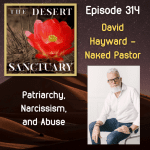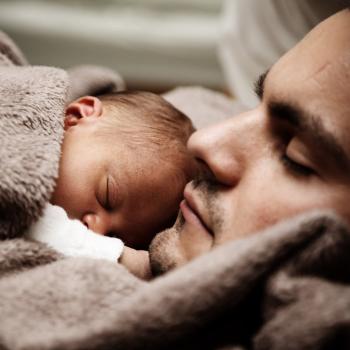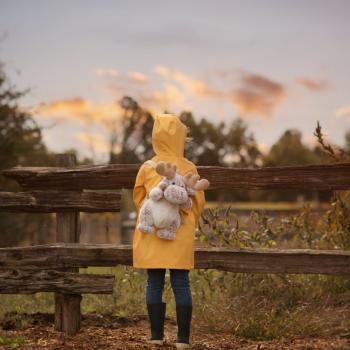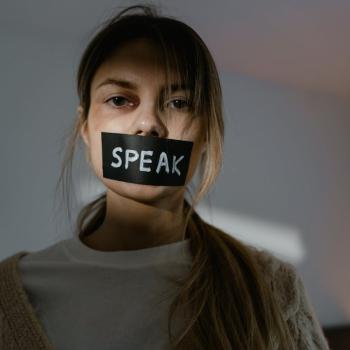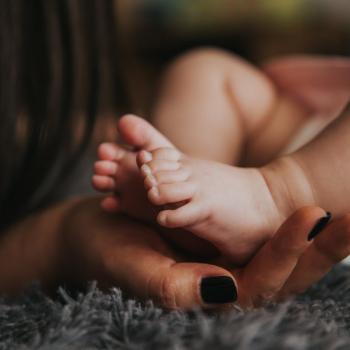Evolving from Racism and Homophobia
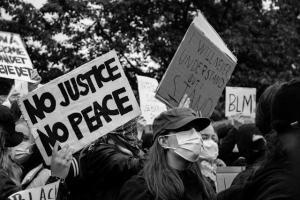
(an excerpt from our book, Leaning Forward)
After starting my deconstruction, I began writing about all the things I was discovering. but even though I was uncovering gaps in my understanding of racial issues and queer concerns, I hesitated to put pen to paper mainly because I realized my limited understanding. After I gained initial knowledge from some of the stories I heard, on our Desert Sanctuary podcast, I came out swinging, and I tried to advocate for both communities.
Spurred by George Floyd’s murder by police, I took a train from Philadelphia to Washington DC, while I was working in Pennsylvania. While there, I walked in two Black Lives Matter rallies and started to get more vocal on social media. I lost many friends. Some just silently walked away and some of them confronted me directly. Because I was in the middle of deconstruction, it did not bother me much because I realized that ALL my new understandings made my old tribes uncomfortable.
Whatever I encountered, caused me to reflect on my understanding. I realized that I was upset about the right thing, but I did not have enough understanding to communicate it well in writing. To a large degree, I still feel this way, but I am not going to let it stop me from moving forward. My ignorance is my problem.
So just like before, allow me to tell my story that hopefully will resonate with you, and you can identify with where I am now.
I wore blackface in a Junior/Senior play, but that is not where my story begins. My earliest memories are from kindergarten and first grade where I attended a school that had forced integration. Every day, buses would show up with people who looked different than me. I do not remember it being an issue. It was somewhere around 1970, and I just remember that there was negative energy about the issue, but I do not recall anything specific.
At my next school, in second grade, we lived closer to the inner city. We went to an elementary school that was truly diverse. My first crush was on a Native American girl there, and my best friends were an Irish kid who looked like Howdy Doody and a Black kid who could outrun all the fourth graders. When the older children would try to pick on us, he would slap them and then run until the recess bell rang. He also wore product in his hair that smelled like strawberries.
But, in third grade, we migrated back to the suburbs. The neighborhood was mostly White, especially when we started attending a private school in fourth grade. It was the conservative, evangelical school where I learned to steal and cuss and chew tobacco. I am quite sure it is also where I picked up some unpleasant habits like using the N-word and telling jokes about Gay and Black people.
In my book, Apparent Faith, I dealt with some topics like tribalism, nationalism, and how Christianity united with the Empire. In these discussions, the idea of the other emerges. It is insidious how humans sometimes treat the other. Many see it as hate, but most people on the inside consider it okay because it is lightly sugar-coated. Most people who are in this box would proudly say they are not racist, but their soft belief is that people who are different are other, and they do not think they have to treat them the same or view them the same as “us.” The other subtle assumption is that they are dangerous. Fearing the others causes fear-based mistakes and causes harm.
Back to my story. We stayed in that suburb and attended that private, Christian School until I went to high school. My dad got a different job in a very rural area, and we started blending into that community. The town that we lived in had a “Black” section of town, often referred to as “N**** Town.” There was only one Black kid in our whole school and that was where the English teacher convinced me to wear blackface in the Junior/Senior play. To the best of my knowledge, no one in the community expressed displeasure at this, and I even invited a couple of the Black athletes from a neighboring town to come watch.
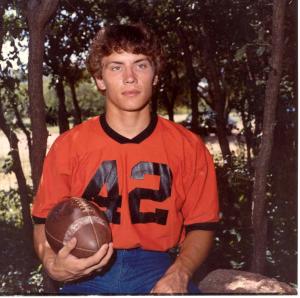
When I think about this today, it makes me cry. For years, when I met a Black person, I would tell them about my performance, and they would change the subject. I saw that same face on a cab driver in DC. It is a long-suffering look, that I have since noticed on other minority faces, like the Mexican guy who was observing White people marching for Black Lives Matter. His face was that same look that seemed to say, “What about us?” or “How long?”
In college, my two best friends were a Native American and a Black guy. But our favorite motto was, “Every day is Christmas,” and we rarely talked about anything important, especially racial injustice. I wish they had told me more stories, and I wish I had asked better questions. I realize now that it is not enough just to congregate with people who are different from us. And for now, I will just leave it at that.
My Grandpa Joe was a simple guy who coached baseball as a hobby. I know that he did things like getting shoes for the poor kids on his teams and I am sure he treated them equally. But he still called them “Colored Kids” and he named one of his cows “Blackie.” He loved all his baseball players, but his conditioning and understanding were that they were different from him. My other grandpa was stoic, so I do not know how he felt about much of anything even though I still feel close to him. He did participate in a fraternity that is known to be unreceptive to people of color. My parents were more open to the latest ideas since it was the ’70s, but we never had any deep conversations about anything like that.
My first job, after college, was in the Dallas-Fort Worth area. It was multicultural and authentically diverse. It was much more colorful, and I worked with people from China, Korea, and even Pennsylvania. Soon, I found myself back in church—and of course, it was Conservative and Evangelical and not that diverse at all. The Southern Baptist Convention, which I gravitated towards, has very segregated congregations. That should not be a surprise to us since the SBC emerged so the slave owners would have a place to call home. So, my maturity stalled out for many years. I did not tell racially motivated jokes, but I also did not progress at all in my understanding. “Love your neighbor” messaging does not accomplish much when the system we are in does not honor that pursuit. Even in the late nineties, my Director of Missions would brag about having a Spanish church, a Chinese church, or several Black churches, but there was little interest in integration or real diversity. Martin Luther King Jr. once said, “11 A. M. Sunday Is Our Most Segregated Hour.”1
After I started my deconstruction and when I stopped defending all my old beliefs, the world opened up to me and I started investigating everything. Before I stepped down from the church I pastored, I wrestled with some of these issues in the pulpit. This discussion got little response from the chosen frozen, but they were helpful to me. I was starting to ask the right questions and listen to what people said.
We interviewed several people on The Desert Sanctuary podcast and mostly tried to listen to what they said. One of these was a group of four Black people. We were determined to listen to them, and two hours later, we were wrecked by their testimony. I read some books that were, at first, hard to understand and hard to relate to. But slowly I started growing and I began to understand better.
It is important to understand the issue of racism as a systemic problem. It is in our DNA. It is in our rituals and our ways of doing things and even in our language. It involves the prison systems, the War on Drugs, and our fears.
May we all keep evolving, asking questions, and refusing to settle for partial solutions or inadequate platitudes.
***
It was common, at the Evangelical, Christian private school, for my friends and I to call each other “gay” or “faggot.” The system that we were in did not acknowledge any kind of legitimacy to the queer community. But they did not just ignore them, they hated them! In their minds, it was about the worst thing you could do, one of the fastest ways to gain a ticket to hell, and one of the worst labels you could assign to someone.
Up until college, I never met a gay person, mostly because no one comes out in those communities. So, when I met some queer people in college, my response was mostly fear related. I just tried to stay away from them. I later found out that my professor was gay, but he would never have the courage to admit it in that area.
Like the racial issue, I do not think I made any progress in this area for a long time. When I became a pastor, in 1997, I took the injunction to “love your neighbor” seriously, but it took me over a decade to pull back all the layers and genuinely start asking the right questions. This culminated in me wrestling with my feelings about same-gender attraction from the pulpit and was the beginning of the end of my ministry. They never asked me to leave, but I could not wrestle with the questions and teach like they wanted me to, at the same time.
I do not have as many stories about my ignorance of queer people because the issue in Evangelical Christianity is so black and white that they do not even discuss it. To them, it is the worst thing you can do to love someone of the same sex in that way. It was not until I broke free from that fear-based, high-control religion that I was able to consider the matter carefully and redirect my motivations. The question changed from, “How do we stop this?” to “How can I love them?” and my ignorance began to erode slowly.
Just Like my feelings about racism, I deeply regret the time that I languished in ignorance and enabled the suffering of others to continue. I try to say this as often as I can:
“I am sorry. I did not know. I am getting better.”
I am sorry for the petty things that I did that were a part of enabling racism and homophobia to continue. I am sorry if I passed these things on through my preaching and my reluctance to risk speaking up against these injustices. I am sorry that my children saw me subtly disparaging these two groups, and I am glad they did not follow my lead. I am sorry that suffering continues simply because of ignorance. An advanced society should be better than this already.
Even though I take full responsibility for my ignorance, I also realize that people who preceded me promoted this ignorance by not saying anything. They did not model courage and genuine love for people because they let their fear of others and their fellow tribe members dominate their actions.
One of the realities of evolving is that it is a continual process. New understanding not only helps us navigate better but also reveals how much we still do not know. But if we give up the temptation to believe we have all the answers, we will stay inquisitive and we will ask better questions next time. We cannot let perfection get in the way of progress. But we also cannot give up just because it is difficult.
I want to have that long-suffering look that I saw in the people I met in Washington DC. I do not want queer people and people of color to admire me. I want to be able to respect myself so that even though I am late to the game, I can finish strong and love my neighbor as myself.
1 https://www.nytimes.com/1964/08/02/archives/11-a-m-sunday-is-our-most-segregated-hour-in-the-light-of-the.html
Be where you are,
Be who you are,
Karl Forehand
Related Post: Leaning Forward – What’s Wrong with Prayer?
https://thedesertsanctuary.org/leaning-forward-2023/

Karl Forehand is a former pastor, podcaster, and award-winning author. His books include Out into the Desert, Leaning Forward, Apparent Faith: What Fatherhood Taught Me About the Father’s Heart, The Tea Shop and Being: A Journey Toward Presence and Authenticity. He is the creator of The Desert Sanctuary podcast and community. He is married to his wife Laura of 35 years and has one dog named Winston. His three children are grown and are beginning to multiply! You can read more about the author here.



